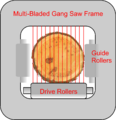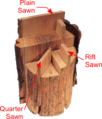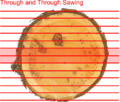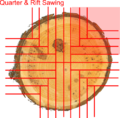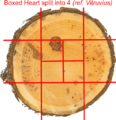Timber: Difference between revisions
From DT Online
Added Main Text |
No edit summary |
||
| (One intermediate revision by the same user not shown) | |||
| Line 1: | Line 1: | ||
[[File:Geograph-136284-by-Richard-Young.jpg|300px|right]] | [[File:Geograph-136284-by-Richard-Young.jpg|300px|right]] | ||
[https://en.wikipedia.org/wiki/Lumber '''Timber'''] is wood from trees that have been [https://en.wikipedia.org/wiki/ | [https://en.wikipedia.org/wiki/Lumber '''Timber'''] is wood from trees that have been [https://en.wikipedia.org/wiki/Felling '''Felled'''], '''[[Timber Conversion|Converted]]''' into boards and '''[[Seasoning|Seasoned]]''' to less than 20% moisture content to produce the most sustainable building material. | ||
'''Timber''' is graded according to its strength, appearance, number of defects etc. | '''Timber''' is sawn into standard sizes and graded according to its strength, appearance, number of defects etc.. Grading is done to conform to British and European Standards both visually and by machine. Strength classes range from C14 to C50 for softwood and D30 to D70 for hardwoods. The higher the number, the stronger the timber. The most common softwood grade for general joinery work is C16. | ||
Latest revision as of 23:09, 4 January 2018
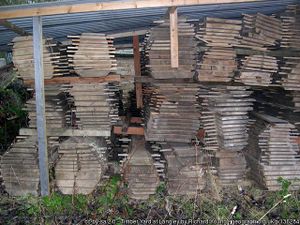
Timber is wood from trees that have been Felled, Converted into boards and Seasoned to less than 20% moisture content to produce the most sustainable building material.
Timber is sawn into standard sizes and graded according to its strength, appearance, number of defects etc.. Grading is done to conform to British and European Standards both visually and by machine. Strength classes range from C14 to C50 for softwood and D30 to D70 for hardwoods. The higher the number, the stronger the timber. The most common softwood grade for general joinery work is C16.
Structural softwoods are available in basic lengths between 1.8m and 7.2m and measured in increments of 300mm. Standard cross sections of sawn softwood are between 75 and 300mm in width and between 22 and 300mm in thickness. Timber which is subsequently planed will commonly have these sizes reduced by 3mm for sections of 150mm or below, or 5mm for larger sections.
Pages in category "Timber"
The following 12 pages are in this category, out of 12 total.
Media in category "Timber"
The following 25 files are in this category, out of 25 total.
-
BuiidersApp.jpg 160 × 160; 7 KB
-
DeathWatchBeetle.png 331 × 237; 151 KB
-
DefectsLabelled.png 280 × 352; 62 KB
-
FurnitureBeetle.png 319 × 212; 81 KB
-
GangSaw.png 848 × 877; 318 KB
-
Geograph-136284-by-Richard-Young.jpg 640 × 480; 116 KB
-
HardwoodLip.png 861 × 323; 289 KB
-
HeartSide.png 587 × 258; 53 KB
-
HouseLonghornBeetle.png 394 × 212; 167 KB
-
KnottyPine.jpg 281 × 180; 7 KB
-
LyctusBeetle.png 402 × 187; 101 KB
-
ManufacturedBoards2.png 689 × 500; 85 KB
-
MedullaryRays.png 300 × 152; 62 KB
-
MoistureContentFormula.png 755 × 50; 11 KB
-
PlainQuarterRiftsawnDifferenceDiagram.png 500 × 585; 271 KB
-
PlainSawn.png 500 × 423; 258 KB
-
QuarterSawn.png 500 × 545; 368 KB
-
RiftSawn.png 500 × 490; 306 KB
-
SawnTimber.png 800 × 375; 285 KB
-
ShakesChecks.png 200 × 252; 70 KB
-
TimberDefects.png 500 × 345; 214 KB
-
TimberStackLabelled.png 648 × 557; 433 KB
-
TreeSectionLabelled.png 726 × 521; 397 KB
-
VitruviusBoxedHeart.png 500 × 518; 406 KB
-
WetRot.jpg 404 × 264; 86 KB




